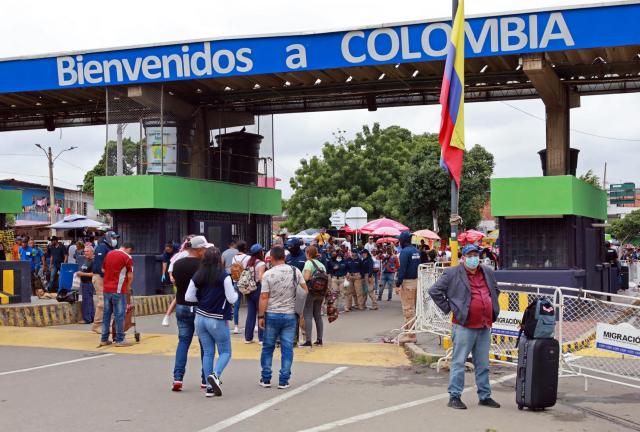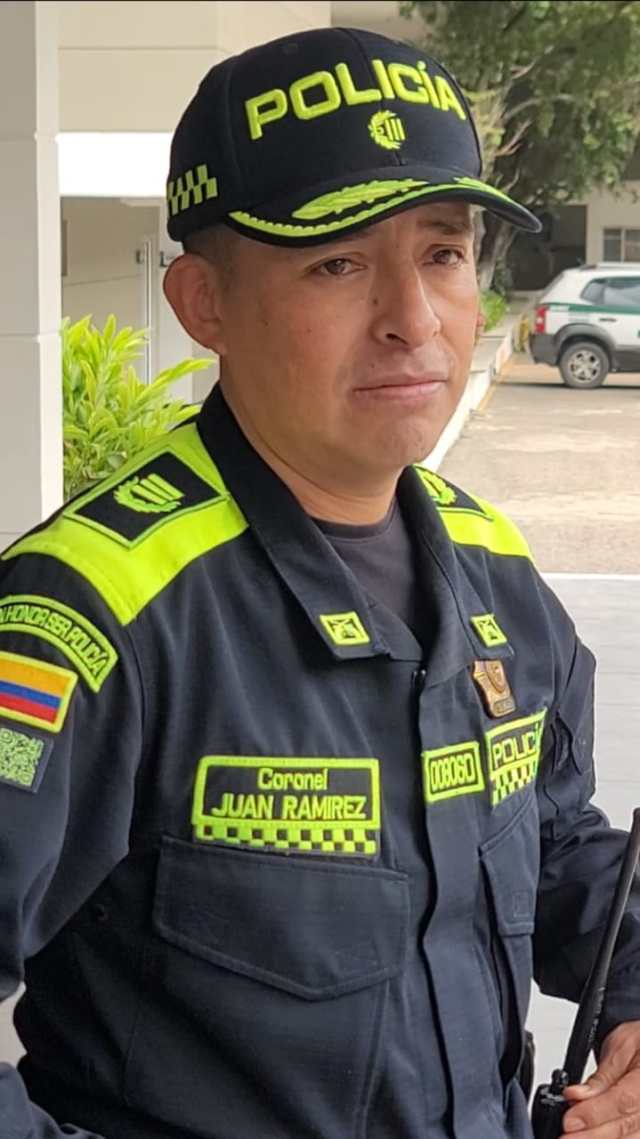
The gradual reopening of the international bridges that link Venezuela with Colombia has had an impact on security on the Colombian border, since the decongestion near the binational crossing has been evident.
By Luz Dary Depablo / lapatilla.com
In an exclusive interview with the reporting team of lapatilla.com, the commander of the Cúcuta Metropolitan Police, Colonel Juan Carlos Ramírez, assured that with the passage of vehicles through the Simón Bolívar International Bridge, crimes have decreased in the town of La Parada.

Has there been any change in terms of security on the Norte de Santander border after the gradual reopening of the border with the entry of Venezuelans?
After September 29th, 2022, when cargo vehicles were allowed to again enter both from Colombia to Venezuela and from Venezuela to our country, on security issues, the figures have been maintained. Migration has increased somewhat, Venezuelan people come to buy essential food here in our city. The last situation regarding the vehicular passage through the Simón Bolívar bridge, which incorporates a special situation in relation to the issue of “La Parada”, which is the first neighborhood when you enter Colombia through the Villa del Rosario municipality, is a complex situation because it housed a series of elements and factors that had an impact on safety and coexistence issues due to the crowd of people who showed up buying all kinds of items and, obviously, that generated the presence of both common and organized crime. As a result of the opening of the border through the Simón Bolívar bridge and the vehicular passage, this totally decreased.
How has the migratory movement been with this reopening?
Controls are becoming more flexible. Migration Colombia is not demanding any special documentation for Venezuelan citizens to pass, compared to what Venezuelans are relevant, in no way or the number of Venezuelans involved in the commission of crimes is high, we are talking about 15% or 16% in all crimes, this is something that is normal. I had the opportunity to work here 20 years ago, let’s say that the same conditions are present.
There has been reciprocity in sharing information, we have been working with the National Guard, with the San Antonio Municipal Police, with the Táchira State Police, with the Venezuelan Judicial Police. We are doing joint work, this has given good results, we have managed captures, we have managed to seize firearms, narcotics, and the idea is to generate in this border area the conditions of coexistence and security necessary to prevent citizens from both Colombians and Venezuelans being affected.
What has happened with the “Tren de Aragua”, they somehow had control of a part of La Parada, there on the border? Did they migrate to another area?
Well, I couldn’t say ‘control’, because the government and the authorities have always had control. In this case, the Government is the National Police and the military. The “Tree de Aragua” are criminals who do not exercise control, they simply commit crimes, we have had a significant increase in the issue of captures, but there is something particular that has been happening, as a result of the boom (relevance) that has been given to this name or to this criminal franchise of the Aragua Train (mega gang). Many common criminals, informal criminals, identify themselves as the “Tren de Aragua” to maybe even instill greater fear on their victims, stating that they are part of this criminal organization, and they have achieved their goal: they have managed to extort and greatly affect the tranquility of citizens. That is why we continue to fight, together with the nation’s Attorney General’s Office, together with the military forces, the political-administrative authorities, the Cúcuta mayor’s office, the Villa del Rosario mayor’s office. Now with the issue of opening the border and the presidential order to reactivate all kinds of coordination, particularly with the Venezuelan authorities, excellent results have been achieved through the exchange of information.
How many alleged members of the Aragua Train have been captured by the Colombian police?
Last year’s figure was around 100 captured who could be linked to this criminal organization, but we cannot confirm such a situation. What’s more, when they make their threat they identify themselves as “Tren de Aragua”, but we cannot exactly say that they are part of this criminal organization.
And so far this year? How many captures?
We are talking side the beginning of the year, we had a case where four captured and to date, I would say that close to 20 have been captured over the past few months, simply people or criminals who identified themselves as “Tren de Aragua”, but there is not one real confirmation that they are part of this criminal organization. In meetings with the National Guard in Venezuela, we have requested information on this criminal structure. They tell us that it is a structure that is completely decimated, and we make the same statement in Colombia. The gang in the border area has been decimated by the structural blows that these criminals have received.
Where have they been confined? What are the legal procedures when one of these alleged criminals is captured?
When they are captured Colombian legislation allows their detention in two circumstances: the first is in flagrante delicto, that is, when they are caught committing an illegal act; the second is non-compliance with an order of a competent judicial authority. In this case, those who are captured by court order go directly to the “Modelo” Prison here in Cúcuta or where a judge decides for the execution of the sentence. Those who are captured in flagrante delicto initially remain in the police units, where we are providing security to persons deprived of their liberty and later, the corresponding transfer is made to prisons, in accordance with the provisions of the judicial authority. .
What is the crime that has had the highest incidence of these people who claim to be part of the Aragua Train?
In a respectful way and without the intention of generating an apology for the crime, well, the simplest thing is extortion. It is simply calling a person on any telephone number and identifying themselves as “Tren de Aragua” and making threats for economic demands. That’s what people commonly fall for. That is why the call that we have made, not only to Colombian citizens, but also to Venezuelans in the border area, is not to fall for or not to accede to this type of threat. Simply do not answer numbers that you do not identify in our cell phones.
Have you managed to identify Venezuelan girls or adolescents who have been recruited by groups to subject them to prostitution?
There is an articulated work with the Family Welfare Institute, with the Office of the Attorney General of the Nation, because for us the National Police has a special strategy, a strategy for the protection of women, family and gender. In this case, minors for Colombian legislation are a priority. They have special protection and therefore, when minors are affected they receive the highest priority. The most important thing is to restore their rights and obviously that the State guarantee their peace of mind. Regarding the issue of whether we have found people linked to prostitution, lately we have not had any cases. There is some information about young people, not minors but young people, who are working in this type of webcam model business, who are being exploited, but that is part of an investigation and some preliminary results that our criminal investigation section has produced.
Have you managed to locate a house where you have found Venezuelan minors against their will?
There is one case. There is a case that is being handled and it will be made public next week as a result that was obtained by the Attorney General’s Office.
On the other hand, have you registered any type of irregularity with the passage of Venezuelan vehicles to the city of Cúcuta after the gradual reopening?
Cúcuta has a peculiarity: here there are more Venezuelan than Colombian vehicles.
Have you noticed any difference with the transit of Venezuelan vehicles after the reopening, as in the case of Venezuela that we do notice when we find a vehicle with Colombian license plates?
No, because there are more Venezuelan vehicles than Colombian ones. This particularity has been the norm for more than 30 years. The verification is still done, as demanded by the legislation, when a person enters a country it must assume the norms of that country. If a Venezuelan vehicle enters this country, it must comply with all regulations and at this time, as a result of the reopening, any foreign vehicles, because here there is a registry of Venezuelan vehicles that are circulating in Colombia and are owned by Colombians or of Venezuelans who are already living in Colombia, or have Colombian citizenship, are already in a system. But if a new vehicle comes, simply the necessary controls are made.
Regarding the gradual reopening, has the number of officials on international bridges and on any specific bridge increased?
There is a special strategy because the border was closed seven years ago, the passage of both vehicles and people was prohibited, since there were special devices. The personnel was withdrawn and as of September 29th (2022) when the bridges were reopened, we deployed a special unit of Metropolitan Police, the Army and obviously, the authorities that are related to immigration issues.

